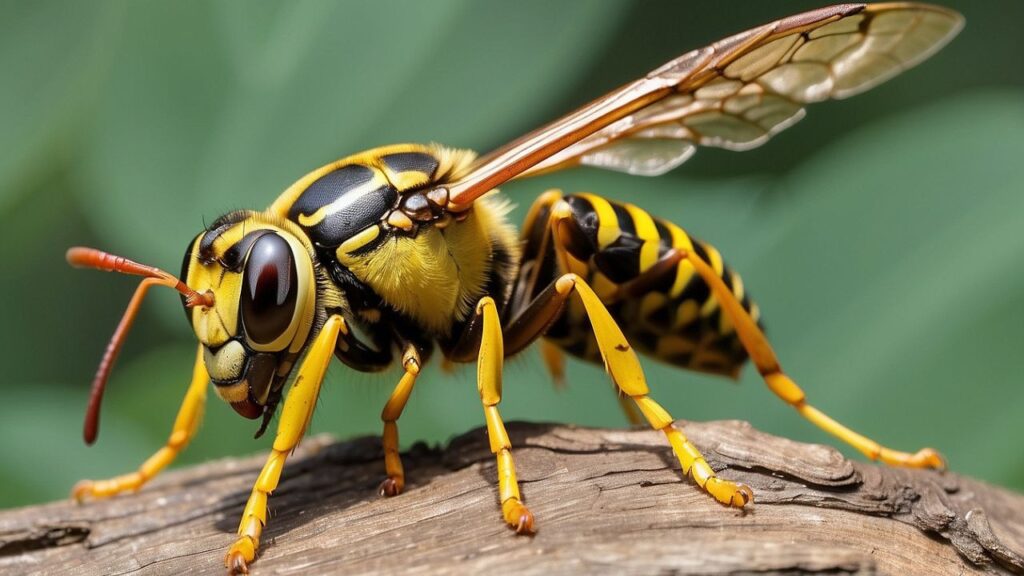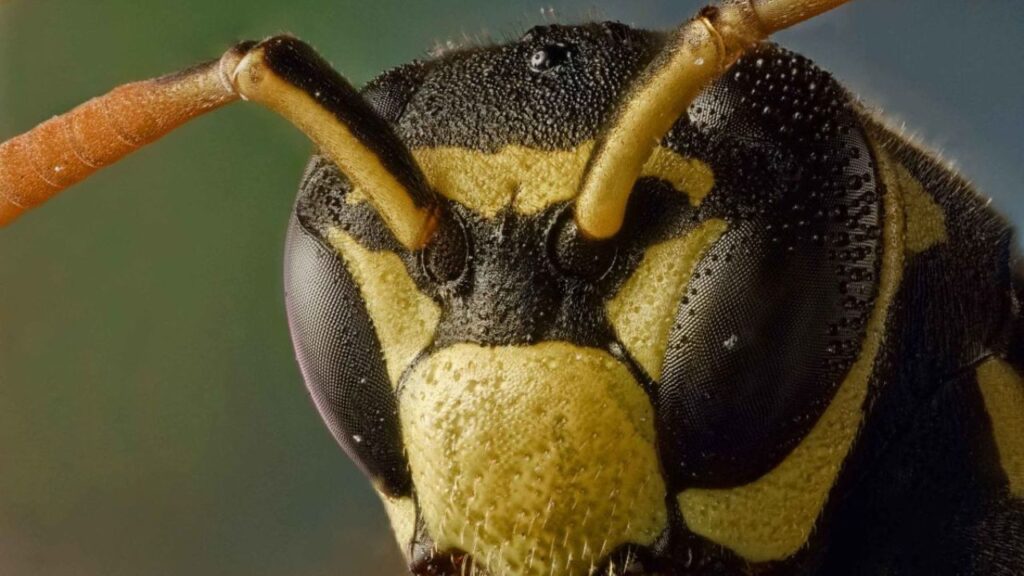Do Wasps Attack Humans? Yes, wasps can attack humans, especially if they feel threatened or their nest is disturbed. They sting repeatedly, which can be dangerous for individuals with allergies.
Wasps are common insects found throughout the world, particularly noticeable in spring and summer.
While they play an essential role in our ecosystem, including pollination and pest control, they have gained a reputation for being aggressive.
This aggressive behavior can sometimes lead to attacks on humans, leaving many wondering what triggers these attacks and how to stay safe around wasps.
In this article, we’ll delve into the nature of wasps, why they might attack humans, and what you can do to prevent and respond to stings.
Contents
What Are Wasps?
Types of Wasps
There are over 30,000 known species of wasps, but the most familiar ones to humans are social wasps, which live in colonies and tend to be more aggressive. The three most common types of wasps encountered are:
- Yellowjackets: These wasps are identifiable by their bright yellow and black stripes. Yellowjackets are social wasps, which means they live in large colonies and protect their nests fiercely. They are most likely to be found around human habitation, as they are attracted to food waste and sugary substances.
- Hornets: Hornets are generally larger than yellowjackets and are known for being more aggressive. They can be dangerous due to the potency of their venom and the intensity of their sting. European hornets, for instance, are common in North America, while Asian giant hornets have also recently gained attention.
- Paper Wasps: These wasps build nests from paper-like materials they create by chewing wood fibers mixed with their saliva. Paper wasps tend to be less aggressive than yellowjackets and hornets but will still defend their nests if they feel threatened. [Do Wasps Attack Humans?]
Wasp Behavior and Habitat
Wasps are commonly found outdoors, especially in wooded areas, gardens, and areas with abundant food sources. [Do Wasps Attack Humans?]
Their nests can appear in a variety of places, from tree branches and bushes to eaves of buildings and underground burrows.
Social wasps like yellowjackets and hornets build colonies, while some, like solitary wasps, are independent and unlikely to sting unless provoked.
Their food preferences vary by species, but many are attracted to sugary substances, proteins, and decaying organic matter.
This is why you might find wasps at picnics, barbecues, or near garbage bins. Wasps also feed on other insects, which makes them valuable in controlling pest populations.

Do Wasps Attack Humans?
When Do Wasps Become Aggressive?
Wasps are naturally defensive insects, and their aggression is most often triggered by the need to protect their colony. [Do Wasps Attack Humans?]
When a human gets too close to a nest or makes sudden movements around wasps, they may feel threatened and respond with an attack.
Wasps are especially protective of their nests in the late summer and early fall when their colonies are at their largest, and food sources are becoming scarcer.
Human activities can also provoke wasp attacks. Outdoor activities like mowing the lawn, gardening, or hiking can disturb hidden nests, leading to an attack.
Wasps use visual and scent cues to recognize potential threats, which is why they may become more aggressive if they sense fear or detect strong scents such as perfumes or insect repellents.
How Wasps Defend Themselves
Unlike bees, which have barbed stingers that detach after stinging once, wasps have smooth stingers that allow them to sting multiple times without injuring themselves.
This makes them particularly formidable because a single wasp can deliver several stings in rapid succession.
Additionally, when a wasp stings, it releases a chemical called an alarm pheromone, signaling other wasps in the vicinity to join the attack.
This pheromone can linger, drawing more wasps to the area even after the initial attack has subsided. [Do Wasps Attack Humans?]
Differences Between Wasps and Bees in Aggression
Bees and wasps are often confused for one another due to their similar appearance and ability to sting. However, their behavior and stinging mechanisms differ significantly.
Bees are generally more docile and only sting when directly threatened, as their barbed stinger remains lodged in the skin, causing the bee to die shortly after stinging.
Wasps, on the other hand, can sting repeatedly and are quicker to respond aggressively.
While bees typically sting as a last resort, wasps may actively defend their territory, especially if they perceive any disturbance around their nest.
Why Are Wasp Stings Dangerous?
Immediate Physical Effects of a Wasp Sting
When stung by a wasp, the affected area often becomes red, swollen, and painful within seconds. [Do Wasps Attack Humans?]
The immediate burning or sharp pain is caused by venom that contains a mix of toxins affecting blood vessels and nerve cells.
These toxins create localized pain, inflammation, and, in some cases, itching that can last for hours.
Swelling around the sting site is common, and some individuals may experience more intense reactions with blistering or bruising.
Potential for Allergic Reactions
For some people, wasp venom can trigger an allergic reaction ranging from mild to severe. [Do Wasps Attack Humans?]
Symptoms of a mild reaction include increased itching, redness, and swelling beyond the sting site, while more severe reactions can result in symptoms such as difficulty breathing, rapid heart rate, or swelling of the face and throat.
These are signs of anaphylaxis, a life-threatening allergic response that requires immediate medical treatment, often involving epinephrine and further care in a medical facility.
Individuals with known allergies to wasp venom are often advised to carry an epinephrine auto-injector, as even a single sting can be fatal.
How Multiple Stings Increase Risk
Being stung by multiple wasps increases the amount of venom in the body, which can lead to severe symptoms even in individuals without allergies.
In cases where someone is attacked by a large group of wasps, the high venom load can overwhelm the body, causing systemic reactions such as dizziness, nausea, vomiting, and even loss of consciousness.
This is particularly dangerous for children, the elderly, and those with preexisting medical conditions. [Do Wasps Attack Humans?]

How to Avoid Wasp Attacks
Tips for Preventing Wasp Encounters
To minimize the risk of wasp encounters, follow these precautionary steps:
- Avoid bright colors and floral patterns in your clothing, as these can attract wasps.
- Refrain from using heavily scented perfumes or lotions, as strong fragrances can draw wasps closer.
- Cover food and sugary drinks when outdoors, especially during summer picnics or barbecues.
- Keep trash cans sealed, as food waste can attract wasps looking for a meal.
Safely Removing Wasps and Nests
If you discover a wasp nest on your property, it’s important to exercise caution. Attempting to remove it yourself can provoke an attack, especially if you disturb a large colony.
Hiring a professional pest control service is often the safest option, as they have the tools and experience necessary to handle wasp nests effectively.
In some cases, pest control specialists may relocate the nest rather than destroy it, especially if the wasps are beneficial species.
If you need to deal with a wasp nest on your own, consider waiting until early morning or late evening when wasps are less active.
Wear protective clothing, and use a commercial wasp spray, standing as far away as possible. [Do Wasps Attack Humans?]
What to Do if You Encounter Wasps
Should you encounter wasps, remain calm and avoid sudden movements. Slowly back away from the area, keeping an eye on the wasps.
Swatting at them or moving abruptly can provoke an attack, so try to stay as still as possible until you’re at a safe distance. If a wasp lands on you, gently brush it off rather than swatting at it.
What to Do If You Are Stung by a Wasp
Immediate First Aid Steps
If stung, remove yourself from the area to prevent further stings. Clean the sting site with soap and water to reduce the risk of infection.
Applying ice can help reduce pain and swelling; you can use a cloth-wrapped ice pack for about 10 minutes. [Do Wasps Attack Humans?]
Taking an over-the-counter antihistamine can help alleviate itching and further swelling, while an anti-inflammatory pain reliever can ease the pain.
When to Seek Medical Help
You should seek medical assistance if you experience signs of an allergic reaction, such as trouble breathing, dizziness, or swelling beyond the sting site.
Also, if you are stung multiple times or have a history of allergic reactions to insect stings, it’s best to consult a doctor. [Do Wasps Attack Humans?]
In the case of anaphylaxis, emergency medical care is crucial, as prompt administration of epinephrine can be life-saving.
See Also: Do Spiders Attack Humans? The Hidden Menace!
FAQs
Why do wasps sting multiple times?
Wasps have smooth stingers that allow them to retract and sting multiple times, unlike bees which lose their stingers after one sting. [Do Wasps Attack Humans?]
Are wasps more aggressive than bees?
Yes, wasps are generally more aggressive, as they can sting repeatedly and are quicker to defend their territory, especially when they feel threatened.
Can wasps attack without being provoked?
Wasps typically sting in response to perceived threats, but even minimal disturbances near their nest can lead to an attack.
What is the best way to treat a wasp sting?
Clean the sting site, apply ice, and consider taking an antihistamine to reduce swelling and discomfort. For severe reactions, seek medical attention.
How can I keep wasps away from my home?
Regularly inspect your home for nests, cover food and garbage, and use natural wasp deterrents like essential oils in outdoor areas.
Conclusion: Do Wasps Attack Humans?
While wasps play a valuable role in nature, their presence can be a concern due to their ability to sting repeatedly.
By understanding wasp behavior and taking preventive measures, you can reduce your risk of being stung. [Do Wasps Attack Humans?]
If you do experience a wasp sting, knowing how to treat it properly and when to seek medical help is essential.
Remember, when it comes to wasps, staying informed and practicing caution can help keep you safe.

Hello, I am Rosa Ellis, a mother of two and a wildlife blogger. I grew up in New York City, but I love exploring forests. I’ve traveled to places like Yellowstone National Park and the Amazon Rainforest to see animals up close. I know a lot about animal behavior and which animals can be dangerous to humans. Thanks for visiting my blog!

